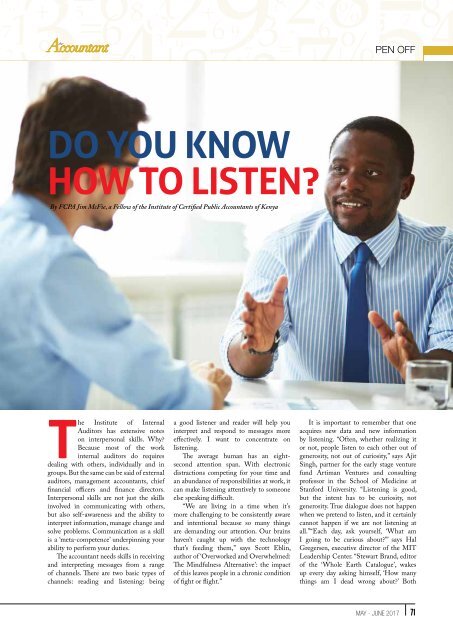The Accountant-May-June 2017
You also want an ePaper? Increase the reach of your titles
YUMPU automatically turns print PDFs into web optimized ePapers that Google loves.
PEN OFF<br />
DO YOU KNOW<br />
HOW TO LISTEN?<br />
By FCPA Jim McFie, a Fellow of the Institute of Certified Public <strong>Accountant</strong>s of Kenya<br />
<strong>The</strong> Institute of Internal<br />
Auditors has extensive notes<br />
on interpersonal skills. Why?<br />
Because most of the work<br />
internal auditors do requires<br />
dealing with others, individually and in<br />
groups. But the same can be said of external<br />
auditors, management accountants, chief<br />
financial officers and finance directors.<br />
Interpersonal skills are not just the skills<br />
involved in communicating with others,<br />
but also self-awareness and the ability to<br />
interpret information, manage change and<br />
solve problems. Communication as a skill<br />
is a ‘meta-competence’ underpinning your<br />
ability to perform your duties.<br />
<strong>The</strong> accountant needs skills in receiving<br />
and interpreting messages from a range<br />
of channels. <strong>The</strong>re are two basic types of<br />
channels: reading and listening: being<br />
a good listener and reader will help you<br />
interpret and respond to messages more<br />
effectively. I want to concentrate on<br />
listening.<br />
<strong>The</strong> average human has an eightsecond<br />
attention span. With electronic<br />
distractions competing for your time and<br />
an abundance of responsibilities at work, it<br />
can make listening attentively to someone<br />
else speaking difficult.<br />
“We are living in a time when it’s<br />
more challenging to be consistently aware<br />
and intentional because so many things<br />
are demanding our attention. Our brains<br />
haven’t caught up with the technology<br />
that’s feeding them,” says Scott Eblin,<br />
author of ‘Overworked and Overwhelmed:<br />
<strong>The</strong> Mindfulness Alternative’: the impact<br />
of this leaves people in a chronic condition<br />
of fight or flight.”<br />
It is important to remember that one<br />
acquires new data and new information<br />
by listening. “Often, whether realizing it<br />
or not, people listen to each other out of<br />
generosity, not out of curiosity,” says Ajit<br />
Singh, partner for the early stage venture<br />
fund Artiman Ventures and consulting<br />
professor in the School of Medicine at<br />
Stanford University. “Listening is good,<br />
but the intent has to be curiosity, not<br />
generosity. True dialogue does not happen<br />
when we pretend to listen, and it certainly<br />
cannot happen if we are not listening at<br />
all.”“Each day, ask yourself, ‘What am<br />
I going to be curious about?’” says Hal<br />
Gregersen, executive director of the MIT<br />
Leadership Center. “Stewart Brand, editor<br />
of the ‘Whole Earth Catalogue’, wakes<br />
up every day asking himself, ‘How many<br />
things am I dead wrong about?’ Both<br />
MAY - JUNE <strong>2017</strong> 71

















